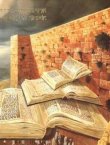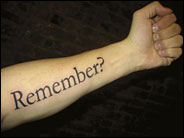A November 27 Chicago Tribune article by Julia Keller bundles together hypertext fiction, blogging, texting, and new electronic distribution methods for books under a discussion of “e-literature.” Interviewing Scott Rettberg (of Grand Text Auto) and MIT’s William J. Mitchell, the reporter argues that the hallmark of e-literature is increased consumer control over the shape and content of a book:
Literature, like all genres, is being reimagined and remade by the constantly unfolding extravagance of technological advances. The question of who’s in charge — the producer or the consumer — is increasingly relevant to the literary world. The idea of the book as an inert entity is gradually giving way to the idea of the book as a fluid, formless repository for an ever-changing variety of words and ideas by a constantly modified cast of writers.
A fluid, formless repository? Ever-changing words? This is the Ipod version of the future of literature, and I’m having a hard time articulating why I find it disturbing. It might be the idea that the digitized literature will bring about a sort of consumer revolution. I can’t help but think of this idea as a strange rearticulation of the Marxist rhetoric of the Language Poets, a group of experimental writers who claimed to give the reader a greater role in the production process of a literary work as part of critique of capitalism (more on this here). In the Ipod model of e-literature, readers don’t challenge the capitalist sytem: they are consumers, empowered by their purchasing power.
There’s also a a contradiction in the article itself: Keller’s evolutionary narrative, in which the “inert book” slowly becomes an obsolete concept, is undermined by her last paragraphs. She ends the article by quoting Mitchell, who insists that there will always be a place for “traditional paper-based literature” because a book “feels good, looks good — it really works.” This gets us back to Malcolm Gladwell territory: is it true that paper books will always seem to work better than digital ones? Or is it just too difficult to think beyond what “feels good” right now?
Category Archives: hypertext
the book in the network – masses of metadata
In this weekend’s Boston Globe, David Weinberger delivers the metadata angle on Google Print:
…despite the present focus on who owns the digitized content of books, the more critical battle for readers will be over how we manage the information about that content-information that’s known technically as metadata.
…we’re going to need massive collections of metadata about each book. Some of this metadata will come from the publishers. But much of it will come from users who write reviews, add comments and annotations to the digital text, and draw connections between, for example, chapters in two different books.
As the digital revolution continues, and as we generate more and more ways of organizing and linking books-integrating information from publishers, libraries and, most radically, other readers-all this metadata will not only let us find books, it will provide the context within which we read them.
The book in the network is a barnacled spirit, carrying with it the sum of its various accretions. Each book is also its own library by virtue not only of what it links to itself, but of what its readers are linking to, of what its readers are reading. Each book is also a milk crate of earlier drafts. It carries its versions with it. A lot of weight for something physically weightless.
electronic literature collection – call for works
The Electronic Literature Organization seeks submissions for the first Electronic Literature Collection. We invite the submission of literary works that take advantage of the capabilities and contexts provided by the computer. Works will be accepted until January 31, 2006. Up to three works per author will be considered.
The Electronic Literature Collection will be an annual publication of current and older electronic literature in a form suitable for individual, public library, and classroom use. The publication will be made available both online, where it will be available for download for free, and as a packaged, cross-platform CD-ROM, in a case appropriate for library processing, marking, and distribution. The contents of the Collection will be offered under a Creative Commons license so that libraries and educational institutions will be allowed to duplicate and install works and individuals will be free to share the disc with others.
The editorial collective for the first volume of the Electronic Literature Collection, to be published in 2006, is:
N. Katherine Hayles
Nick Montfort
Scott Rettberg
Stephanie Strickland
Go here for full submission guidelines.
“the minotaur project” featured at ELO
Kim’s hypermedia poem cluster, “The Minotaur Project,” is currently featured at the Electronic Literature Organization. Highly recommended.
digital torah
 Varda Books, in collaboration with The Jewish Publication Society, has over the last few years been publishing a series of electronic editions of sacred Jewish texts, commentaries, historical studies, and critical resources, all leveraging the dynamic analytic capabilities of digital media. Popular on Varda’s online retail site, ebookshuk, are book “bundles” – collections of sacred texts and critical commentaries that enable nimble and complex intertextual analysis, or, as described for the “JPS Digital Torah Library,” serve as the “cornerstone of one’s personal, open-standards, inter-linked, cross-file-searchable, digital Jewish library.” Other bundles include “Judaic Scholar Digital Reference Library I” and “The Rabbinic Bookshelf.”
Varda Books, in collaboration with The Jewish Publication Society, has over the last few years been publishing a series of electronic editions of sacred Jewish texts, commentaries, historical studies, and critical resources, all leveraging the dynamic analytic capabilities of digital media. Popular on Varda’s online retail site, ebookshuk, are book “bundles” – collections of sacred texts and critical commentaries that enable nimble and complex intertextual analysis, or, as described for the “JPS Digital Torah Library,” serve as the “cornerstone of one’s personal, open-standards, inter-linked, cross-file-searchable, digital Jewish library.” Other bundles include “Judaic Scholar Digital Reference Library I” and “The Rabbinic Bookshelf.”
Jewish scriptural study and the Talmud have often been cited as among the earliest great hypertext traditions. Layered interpretations and non-linear modes of reading have long been central to this tradition, which continues to evolve into digital space.
Intertextual Community
 When I read about Shelly Jackson’s new project–to “publish” a story by tattooing each of its 2,095 words onto the body of a different person–I thought what a great idea, and I wondered if it might actually be telling us something about the direction books are going. As the digital book begins to emerge–glorious, ephemeral, and electric–are we going to feel compelled to make something even more intimate and rarified as counterpoint?
When I read about Shelly Jackson’s new project–to “publish” a story by tattooing each of its 2,095 words onto the body of a different person–I thought what a great idea, and I wondered if it might actually be telling us something about the direction books are going. As the digital book begins to emerge–glorious, ephemeral, and electric–are we going to feel compelled to make something even more intimate and rarified as counterpoint?
“Skin Literature”
